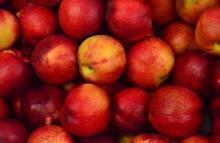During these holidays, it’s traditional to wish each other the blessing of a “sweet new year” and seal it by eating apples dipped in honey. I love that. Whether I receive or offer this blessing, it always makes me feel warm and cared for, and the apples are delicious, too.
In the Buddhist tradition, renunciation is considered a central aspect of the practice. Sometimes we think of renunciation as giving up our luxuries and comforts, stripping down to the bare essentials of our lives into our own definitions of austerity. And there are times when this exploration can help us understand ourselves in new and instructive ways.
I think of renunciation as letting go of the aspects or habits in my life that really don’t support my well-being. This is a cornerstone of practice; showing up for what’s there, seeing it, feeling it, understanding it. Renunciation invites a certain kind of discipline and determination to adjust, and ultimately the freedom to make clear, wise, skillful choices.
This brings up the Buddha’s compass question, “What when I do it, will be for my long-term welfare and happiness?” Inherent in that question are these considerations: what actions can I take that support and benefit both my own well-being and that of those around me? How can I be of benefit in the broadest sense of the word?
As I've explored renunciation as a practice in the context of the Buddha's question, I've come to experience it most strongly as the very natural and uncontrived expression of generosity. And this lifts my heart and strengthens my well-being.
A few years ago my husband gave me a birthday card on the front of which was a beautiful print of a Western Tanager perched on a branch, one of my favorite birds. The caption said “Look Forward Brightly.” I framed the card and it hangs above my desk so I see it every day. Whatever your tradition, I wish you a very sweet year ahead filled with care and kindness, love and hope. Let’s do our best to care for one another and look forward brightly.

